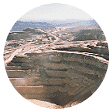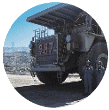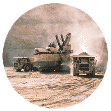What we are
PROBLEM
Human biology and physiology are structured to be developed and maintained
under certain established environmental conditions. If these conditions
are modified, peopleās health and well being are also modified. This is
how the physical needs required for tasks that are carried out at some
altitude by workers who live regularly at the sea level ö as it mainly
happens in the mining activity in our country- convey a series of physical
and psychological changes that affect performance.
The lack of oxygen and the variation in pressure can cause, for example:
headaches, insomnia, nausea, dizziness, fatigue that have a negative impact
in the productive performance and capacities of a worker. This places
the worker in a vulnerable position for dangerous accidents. Besides,
it also has to be taken into consideration that the worker has been temporarily
separated from his family and the isolating conditions of the working
place.
 |
 |
 |
What CETHA does
CETHA’s action is related to establishing the most adequate mechanisms
in order to improve the working environment under difficult conditions
for the worker. It is also related to observing human behavior in working
situations under extreme conditions. Considering the importance of human
work in altitude, Asociación Chilena de Seguridad, through CETHA
has focused its action on the hypoxy and reoxygenation phenomenon,
based on a simulation on an hypobaric Camera on altitude conditions up
to 5000 meters over the sea level.
A group of professionals from C.E.T.H.A. has focused its research on the
oxidant stress and the anti-oxidant capacity; the role the hemoglobin
saturation can play as a predictor for altitude adaptation; physical activity
and healthy food as important factors to avoid the cardio-vascular risk;
measurement of the physical load on different working spots and finally
the search of an anti-oxidant therapy for the arsenic genotoxicity.
BACKGROUND
An increasing number of workers, that only in the II Region is more than
30.000 people, are somehow exposed to hypobaric hypoxia, a new way of
relation between man and altitude. This has become a challenge for ensuring
health at work. The need to promote research systems that facilitate the
acquisition of necessary knowledge in this new form of mining exploitation,
guide health prevention, health care and health promotion for workers
and their families. The social and economic circumstances that lead to
a change on the development level of the country, forces a technologic
improvement and the need of healthy and trained workers. The need of systematic
knowledge and improvements that are happening in this new research area
will give a better service to member companies so that they can improve
their productivity and can have healthy employees. There is agreement
in relation to the adoption of the hypobaric hypoxy, which is the result
of a work done under extreme conditions. This evaluates the human ability
for physiological adaptation. At the same time workers are working on
shifts, that alter the classic way of living of an occidental family,
affecting the personal and group health.
There is a important local, regional and worldwide interest on this way
of mining exploitation and ACHS, as a leading company in law administration
on work related accidents and professional diseases, must propose modifications
that might help men to have a better adaptation to work on altitude and
to diminish the negative impact on health.
WORK AND RESEARCH AREAS
|
Tolerance test to altitude on camera. |
|
|
Oxidant Stress and altitude. |
|
|
Physical load. |
|
|
Shifts and schedules in altitude. |
|
|
Arsenic - Cancer - Altitude. |
|
|
MAM prevailing. |
|
|
Diet and physical activity in altitude. |